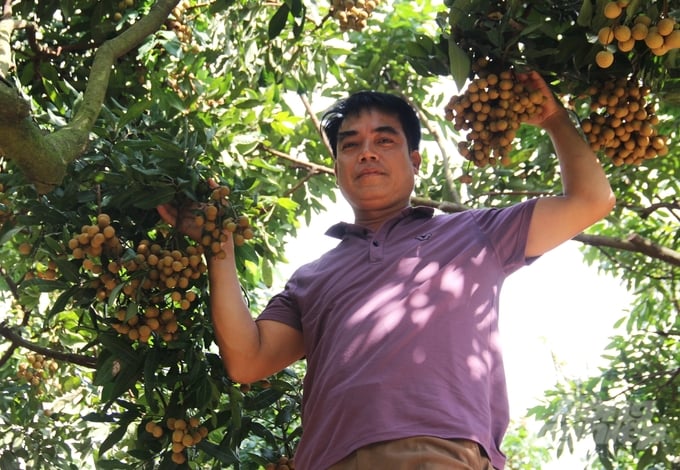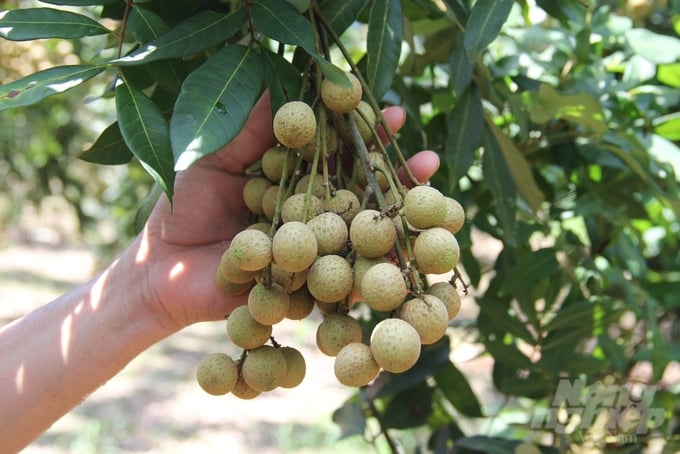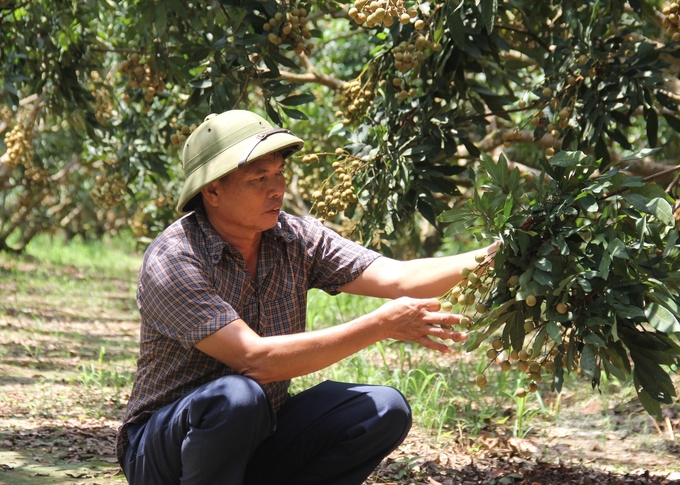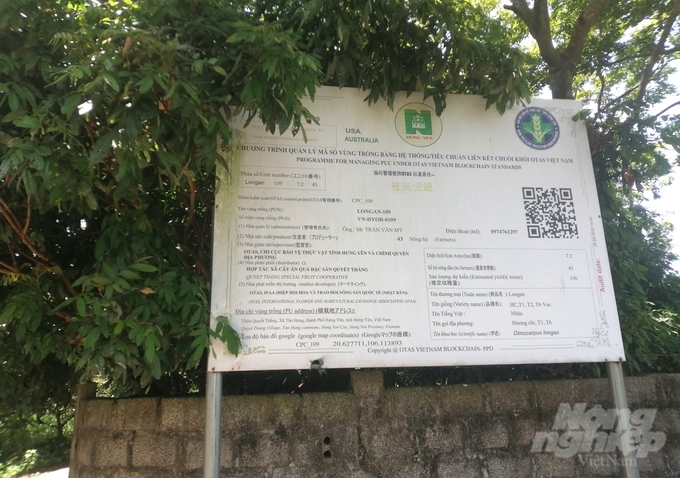May 18, 2025 | 19:08 GMT +7
May 18, 2025 | 19:08 GMT +7
Hotline: 0913.378.918
May 18, 2025 | 19:08 GMT +7
Hotline: 0913.378.918
The Quyet Thang Specialty Fruit Cooperative, located in Tan Hung Commune, Hung Yen City, is the first cooperative in the province to successfully export 5 tons of longan to the EU market. For longan to be exported to the EU and other markets, Mr. Tran Van My, the director of the cooperative, emphasized that farmers must consistently recall that "failing to prepare is preparing to fail." This implies that it is imperative to rigorously comply with the regulations and requirements established by the import markets during the production process. Farmers may find it challenging to adhere to this standard at first, as traditional farming practices are profoundly ingrained. However, with determination, it is feasible.
Each year, the Provincial Plant Protection Department provides comprehensive training to households in the export-oriented growing areas that are involved in production. This training covers the list of permitted plant protection drugs, food safety standards, and the recording of care logs. Furthermore, the cooperative promotes the development of organic production in households to reduce the use of chemical inputs and ultimately replace them entirely with biological inputs.

Close supervision in growing areas is a prerequisite for Hung Yen longan to be able to travel far. Photo: Trung Quan.
After receiving pest and disease recommendations from professional agencies, the cooperative serves as the primary supplier of drugs to households or advises them to purchase the recommended drugs from reputable sources that have been approved by the authorities to manage the use of plant protection agents. The cooperative also collaborates with local pesticide dealers to maintain a record of the households that purchase medications for monitoring. The cooperative's supervisory council will conduct an immediate inspection of the gardens if there is any suspicion of the use of non-recommended drugs.
The Quyet Thang Cooperative's leadership and supervisory board conduct inspections directly, rather than establishing small production teams that supervise each other, as is customary. Cross-supervision may be effective initially; however, it may result in leniency over time due to social customs and familiarity, which could result in significant issues if not promptly addressed.
"It is challenging to acquire a production code; however, it is even more challenging to maintain it. Nevertheless, producers will be able to modify their farming practices by adhering to safety regulations in the production process. In the short term, households are aware that their actions are advantageous. Nothing is more amazing than exporting the product overseas", Mr. My concluded and shared that Hung Yen longan can still be readily accessed in clean food stores and supermarkets, and farmers continue to earn substantial profits, even if it is unable to be exported due to external factors.
Mr. Nguyen Van Biet, Deputy Director of the Quang Chau Commune Longan Cooperative (Hung Yen City), expressed his enthusiasm for the cooperative's recent acquisition of two export codes for the Japanese and Chinese markets. This will enable the cooperative to conduct online inspections or collect samples for direct inspection in certified longan growing areas. The households under these two codes voluntarily supervise each stage to ensure that the standards are always higher than required, although the two markets differ in their strictness.
Mr. Biet maintains that the exportation of longan is contingent upon the implementation of rigorous supervision in the cultivation areas. It is imperative to exercise caution when selecting longans, as harvesting five tons under the same code does not ensure that all five tons meet export standards. The products will only acquire the highest level of uniformity when the growing gardens adhere to a unified process, which will facilitate the fulfillment of business supply demands.

Hung Yen longan has entered the harvest season. Photo: Trung Quan.
"Supervision is one thing; however, the producers themselves must prioritize self-discipline. There have been instances in which samples satisfied the testing requirements; however, they failed to satisfy the standards upon harvest. Biet expressed his confidence that producers should not be concerned about losses, as consumers are willing to pay a premium for high-quality products. I consistently advise my colleagues to execute their tasks with precision, and they will be in high demand," he stated.
In the province of Hung Yen, longan is a critical crop with substantial economic significance. The Hung Yen longan brand has been established in numerous markets worldwide, in addition to the domestic market, over the years. To achieve these results, it has been necessary to implement a meticulous production organization and rigorous quality control in the agricultural regions. These areas have received special attention from management levels, cooperatives, and production households.

According to Mr. Tran Van My, Director of Quyet Thang Specialty Fruit Cooperative, for longan export, if you fail in preparation, you are preparing to fail. Photo: Trung Quan.
Mr. Le Minh Nam, the Deputy Director of the Hung Yen Plant Protection Department, stated that the company is committed to expanding its market presence to reduce pressure and improve consumption efficiency. In addition to the domestic market, the company is also focused on capturing a variety of global markets. The province has been in the process of establishing a production unit code (PUC) and exporting longan to the U.S. market since 2015. Currently, the province is home to 19 longan growing areas and 39 codes that are intended for export to markets in the United States, Australia, Japan, and China.
The quality of products is subject to varying standards in each import market, and inspections are consistently enhanced, both in person and online. Consequently, the establishment and administration of PUC necessitate the implementation of exceedingly stringent and rigorous standards.
The Hưng Yên Plant Protection Department conducts annual inspections and supervises the establishment and administration of the issued PUCs following regulations. The codes will be decisively revoked for those growing areas that have been issued codes if they fail to meet requirements during inspections and evaluations. A recommendation for re-issuance will only be made after the necessary standards have been met. New growing areas with organized production and suitable conditions will be closely monitored and proposed to the Plant Protection Department for negotiations to be added to the PUC list.
Furthermore, the Department works in conjunction with pertinent units to closely monitor pests, analyze samples for food safety indicators, and provide producers with guidance on the proper use of plant protection drugs and fertilizers. Special emphasis is placed on the reduction of the use of chemical plant protection drugs and fertilizers, in favor of the use of organic microbial fertilizers, new-generation biological pesticides, and nano silver, copper, and herbal preparations. This approach is intended to safeguard the environment, human health, and the risk of harmful residues in products. If plant protection medications are required, they should be used exclusively from the approved list, following the "four rights" principle, to ensure that there is sufficient withdrawal time prior to harvest.

Longan growing areas granted export codes in Hung Yen are being closely monitored by management agencies. Photo: Trung Quan.
According to Mr. Nam, the management of PUCs is not without its challenges, despite the benefits. For instance, some cooperatives that represent PUCs are not proactive enough in their role as the primary suppliers of inputs, resulting in situations where households must purchase the recommended inputs from a variety of sources at the time of the authorities' recommendation. This raises the possibility that certain households may opt for inferior products as a result of financial constraints. Additionally, a single household's violation of regulations can have a significant impact on the entire code, given the large number of households that are involved in a single PUC.
Translated by Linh Linh

(VAN) Minister of Agriculture and Environment Do Duc Duy held a meeting with Soopakij Chearavanont, Chairman of C.P. Group, on May 15.
/2025/05/16/3800-0-nongnghiep-143756.jpg)
(VAN) Suntory PepsiCo Vietnam coordinated with the Ministry of Education and Training to implement an education program on water conservation, reaching nearly 1 million primary school students nationwide.

(VAN) Vietnam’s TH Group officially put its high-tech fresh milk processing plant into operation in the Russian Federation, marking a historic moment as the first TH true MILK cartons were produced in Russia.

(VAN) Use of high-quality broodstock and biotechnology is regarded as the most effective approach to ensuring sustainable and economically viable shrimp aquaculture ahead of climate change and the emergence of increasingly intricate disease patterns.

(VAN) Carbon farming is a form of agricultural practices that helps absorb more greenhouse gases than it emits, through smart management of soil, crops, and livestock.

(VAN) This is a key content of the Memorandum of Understanding recently signed between the Vietnam Fisheries Society and Kunihiro Inc of Japan.

(VAN) To achieve the goal, local authorities and businesses in Kon Tum province have fully prepared the necessary conditions for the new Ngoc Linh ginseng planting season.